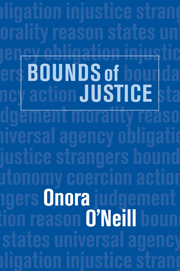Book contents
- Frontmatter
- Contents
- Preface
- Introduction
- Part I Philosophical Bounds of Justice
- 1 Four models of practical reasoning
- 2 Agency and autonomy
- 3 Principles, practical judgement and institutions
- 4 Kant's justice and Kantian justice
- 5 Which are the offers you can't refuse?
- 6 Women's rights: whose obligations?
- Part II Political bounds of justice
- Bibliography
- Index
6 - Women's rights: whose obligations?
Published online by Cambridge University Press: 02 December 2009
- Frontmatter
- Contents
- Preface
- Introduction
- Part I Philosophical Bounds of Justice
- 1 Four models of practical reasoning
- 2 Agency and autonomy
- 3 Principles, practical judgement and institutions
- 4 Kant's justice and Kantian justice
- 5 Which are the offers you can't refuse?
- 6 Women's rights: whose obligations?
- Part II Political bounds of justice
- Bibliography
- Index
Summary
Contemporary rhetoric about justice celebrates human rights, and justice for women is supposed to celebrate women's rights. Yet rights are mere pretence unless others have obligations to respect them. Why, then, do we now talk so relentlessly about rights, and so little about obligations? Does this show that we take rights seriously?
A Martian or a Venusian, listening to the public rhetoric of our day, just to the ordinary pronouncements of politicians and the ordinary reports of the media, might conclude that we take rights very seriously indeed, even that we are obsessed by them. She might even conclude that we take the rights of women very seriously indeed. Women's rights may have seemed shocking when Mary Wollstonecraft chose the title of A Vindication of the Rights of Woman in 1790; now they are part of the rhetoric both of the established order and of its critics. They elicit more yawns and inattention than hostility, although there is still a bit of that.
Taking the rhetoric seriously is one thing; taking the substance seriously another. One of the main uses of this rhetoric is to point out how often human rights, and with them women's rights, are violated. No doubt a gap between rhetoric and reality is unsurprising; but this gap is more than evidence of failure to practise what we preach. To put the matter starkly, if we think about justice primarily in terms of rights, we are more or less bound to find not only that we do not or cannot live up to it, but that we cannot work out what we are trying to live up to.
- Type
- Chapter
- Information
- Bounds of Justice , pp. 97 - 112Publisher: Cambridge University PressPrint publication year: 2000
- 3
- Cited by



